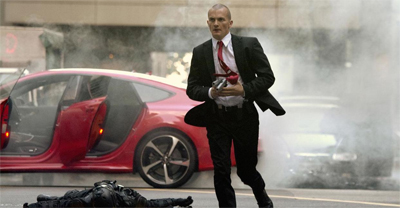Hitman: Agent 47 is not a good film, but it is bad in interesting ways.
The video game adaptation fad of the nineties has given way to a wave of blockbuster comic book movies. Those comic book adaptations have fared much better – both critically and commercially – than fare like Super Mario Brothers or Street Fighter or Mortal Kombat. As such, Hitman: Agent 47 feels like something of an outlier; it is a reboot of a video game property that already failed to take flight in a movie released eight years ago. Even if there is a resurgent interest in video game movies, it seems strange to return to this video game movie.
At the same time, there is something quite compelling about the structuring of Hitman: Agent 47. Perhaps inspired by the success of the relative fidelity of twenty-first century comic book adaptations, Hitman: Agent 47 struggles to provide a relatively faithful adaptation of the game-playing experience. Though the structure and tone of the movie might jar with the source material, director Aleksander Bach is careful to preserve as much of the game-play experience as possible. Extended sequences of Hitman: Agent 47 play as a walkthrough of a life-like video game.
Which, of course, only serves to make the film feel somewhat redundant; watching a bunch of actors play through scripted game-play-like scenarios might offer a faint echo of the thrill of playing a video game, but captures none of the investment.
To be fair, a lot of Hitman: Agent 47 is drawn from the success that the major studios have had with comic book movies. Mythology is layered on heavily; themes are explicitly and bluntly articulated; sequel hooks are deployed in the hopes of leveraging the film into a franchise. However, the biggest lesson that Hitman: Agent 47 has learned from comic book films is that of approximation; while the plotting might depart from the source material, great care has been taken to ensure that Hitman: Agent 47 is not a generic assassination film.
Hitman: Agent 47 strains to evoke its source material. This is obvious in any number of ways. The movie loves topographical overlays, evoking the maps that often guide players through their objectives. Though there is an over-arching structure to the story, individual scenes play like levels, with the eponymous assassin playing tutor to a young apprentice. As goons stalk a warehouse, he has to improvise to turn it into a killing field. “If I shoot one, the rest will converge,” he advises, a soundbyte that could come from a briefing.
Similarly, a later scene finds our characters playing through the classic stealth game scenario of dodging CCTV cameras. When his associate asks what his mission is, he replies, “Right now it means avoiding those security cameras.” Frequent reference is made to the assassin timing his young colleague, one of the classic measures of video game performance. It is worth noting that she completes the stealth mission perfectly, but the film falls back on the old video game standby of positioning a plot-motivated failure just outside the level itself.
Distant authority figures populate Hitman: Agent 47, existing like important characters in a mission-based video game; they are omnipresent, but unassailable until the final levels. Most of the movie is spent chasing one character, only for our heroes to get stuck playing out one of those frustrating “NPC passenger” levels. The villain exists at the literal top of a tower. The film avoids any overt reference to Donkey Kong, but the classic video game structure is recognisable. Missions come from a character removed from our protagonist, a voice on a phone.
Even the camera work evokes video game design. The barcode at the back of Agent 47’s head is his most defining physical trait; it is an important thematic marker and a memorable visual element. The way that Bach lavishes attention on that barcode as much as the character’s face lends the movie the feel of a third-person shooter, as if the audience is hovering around the assassin as he conducts his business. The film runs through stock Hitman elements, down to having the character make gratuitous costume changes because that is something that video game uses.
(Indeed, it is fun to imagine Hitman: Agent 47 as a video game. An early “level” uses strobe lighting to crew effect; various sequences where the characters get out of tight situations look like they should have “press the ‘x’ button” appearing in the corner of the screen. There is a car chase; much is made of setting traps and exploiting the environment. One sequence in the middle of Singapore finds the heroes assailed on all sides by waves of enemies, looking like the perfect closed-off “time trial” or “challenge” level.)
However, all of this draws attention to the fact that it is much more fun to play video games than to watch them. Of course, the success of the “let’s play” phenomenon suggests that it is not as simply as all that, but “let’s play” is a vastly different experience than watching Hitman: Agent 47. Even ignoring the community and performative aspects of those videos, “let’s play” typical exist as a sort of self-aware commentary on the game itself. They are about understanding and appreciating technique; they are rarely about converting the game to a movie-like narrative.
This is perhaps the biggest problem facing Hitman: Agent 47, and a reason why the movie’s efforts to mimic comic book films do not work as well as they might. One of the appeals of Marvel’s approach to cinema has been taking narrative elements from the comic book world and applying them to film; crossovers and legacy characters might not be an established cinematic tradition, but they are not inherently incompatible with the cinematic form. Movie audiences are fascinating by these elements, because they are inherently novel and exciting.
It is notable that the films that hew closest to the actual storytelling structure of comic books – like Ang Lee’s Hulk or Zack Snyder’s Watchmen – are more often discussed as noble failures rather than pure triumphs. There is some art in the attempt, but part of translating a story from one medium to another is recognising what works in that medium and what doesn’t. Marvel have been very good at realising what can work, and generally avoiding what can’t; they are very good at identifying comic book elements that can work in live action cinema.
Adapting a video game to film is a daunting challenge. What makes video games so unique and so compelling is precisely what differentiates them from film; in playing a video game, the player exerts at least some control over the pacing and narrative. They literally dictate what happens on screen, whether in something as abstract and non-linear as Tetris or something as intricate and grounded as The Last of Us. That interactivity is lost in a translation to the big screen. A video game has an infinite number of narratives; a film has just one.
This is not to dismiss video games as art. Video games are as valid an art form as film or television or prose. Any attempt to dismiss that is just fear of a relatively novel artform; it is the same elitishness that argues television is the crass younger brother of film, or that comic books are inherently inferior to prose. This is particularly true in recent years, with the video game market expanding to cater for all sorts of tastes. There are big blockbusters and indie adventures, verisimilitude and absurdism.
However, part of acknowledging the validity of an artform is recognising that different media have different attributes. Some are closer than others, but adapting from one form to another is always a challenge. Even the adaptation of close cousins – like television to film or stage to film – can falter; some are almost impossible. Trying to accurately capture the experience of a video game on the big screen is difficult, like trying to turn Koyaanisqati into prose. Is what made the original so appealing lost in the process?
After all, the fidelity of Hitman: Agent 47 only serves to emphasise that the appeal of the video game series was never rooted in its storytelling. For all that Hitman: Agent 47 strains to be faithful to its source material, it only draws attention to the fact that the “world” of Hitman existed primarily as a backdrop to fun immersive setpieces. Trying to pitch an evil organisation that looks like Apple and trades under the brand name “Syndicate International” only emphasises the absurdity of it all. It is rare for a film to be so specific about being so generic.
Hitman: Agent 47 is an intriguing mess of a film, an interesting example of many of the adaptational hurdles facing any attempt to bring a video game to the bigger screen. Maybe next time, they should just plug the console directly into the projector.
Filed under: Non-Review Reviews | Tagged: film, Hitman, hitman agent 47, Movie, non-review review, review, video games |




























I would argue that video games are not art. The way I see art is that art inspires interpretation or creativity. I do not see how video games do either, thus they cannot be art.
Good review though. Most reviews of this movie have focused on the excessive product placement, so it is nice to get a different opinion.
Thanks William.
I think that video games are overlooked in discussion of art – particularly “pop art.” I think that there is material in video games that does inspire interpretation and creativity, although looking for it in big blockbuster games is like looking for it in blockbuster cinema or the most popular television; it might be there, but it’s harder to find.
(I don’t delve too deep into the world myself, but I find pieces like those over at Gameological fascinating. For example, the discussion of how the romance dynamics in the Fallout Games exist as an extension of the RPG’s central philosophy was one of the more interesting pieces of commentary I read last week.)
In terms of narrative, I think games like Gone Home or The Stanley Parable demonstrate the ability of the player to dictate narrative within a video game, but I don’t even think narrative is the deciding factor. I think that games like – say – Digger do encourage creativity an engagement in a manner that is more than just reflexes or hand-eye coordination. I think that there definitely is the creativity there that merits more mainstream attention than it gets.
Here’s a fascinating piece on Going Home.
(Which is perhaps part of my issue with Gamergate’s prohibitive attempts to define what “gaming” is and to argue for “objective” reviews. There is no one right way to make or market or play a game, just as there’s no one right way to make or market or watch a film. Gamergaters are entitled to find their fun and enjoyment in what they want, because everybody should be able to find something they enjoy, but it seems mean-spirited to argue that just because something is not tailored to your expectations means it has no right to exist.)
Sorry about the digression, but that’s where I come from when it comes to video gaming.
I love the Hitman series. Each one is wildly different, it’s stylish, it has a great noir feel which is absent from western FPS games.
That said, Hitman is not known for its tight plotting. I think the original game came out in 1999, when everything under the sun had an obligatory “clone” twist. The story made no sense even then, and the inconsistencies just piled up with each sequel until, like Millennium, you virtually had to treat each story as standalone.
Anyway, Hitman is already a pastiche of old movies. (The original had references to Bond, Terminator 2, and Scarface. Contracts gave shout outs to The Most Dangerous Game and Leon the Professional.) Like Resident Evil, you’re already starting out from a disadvantage when adapt something which is a hodgepodge of other material.
Yep. The movie is a really specific adaptation of a very generic property, which points to the absurdity of this approach for this subject matter.
Video game = Perfect Story and perfect artist. And This moovie a Joke….. Who is this skiny guy???? SO BAD !!!!! This silent killer is still doing its job all time….. and this noob through the city killing. Thx Amerika !!!!!!!!! You are a shit -.-
That’s a little harsh on America, surely?